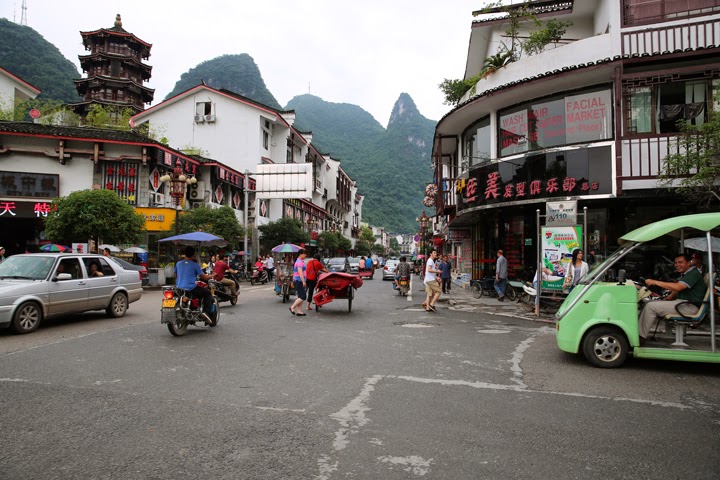A corner of our room at the Waterfall Hotel.
View of the street below our hotel room window.
In China, Guilin is considered very small, with a population of only 700,000. Our guide was Tao, and his English was excellent! (The best of any guide on our trip.)
Tao is married and has an 11-month old son. He is part of the younger generation in China who want to benefit from the recent change in the law so that, since his wife is an only child, they will be able to have two children instead of just one. Also, his wife stays home to raise their son rather than working and having the grandparents do it. (Another up and coming trend in China.)
Tao said his major in college was Tourism English.
Tao said his major in college was Tourism English.
His father and grandfather are farmers, as is 60% of the population in Guilin. The government allots each farmer 1/6th of an acre to farm for 30 years. Then, the gov't takes it back and the land allocations are redistributed. Until Tao got his degree, he was also given a 1/6th acre plot to farm (since his family are farmers), but, now that he is working in another industry, he no longer gets it.
People don't live on their farms. They live in towns or villages and bike (or travel in some other way) to the land they are farming. A good farmer can grow 800 lbs of rice on their 1/6th acre each year. Rice is the main crop grown here since Tao said they average six feet of rainfall a year! (We asked about crop rotation, but that doesn't seem to be something they practice.)
After a delicious buffet breakfast at the hotel, we went to the Zhu Jiang Wharf and boarded a boat for a cruise down the Li River. Many Chinese paintings include images of the beautiful limestone, rock formations (karst) all along this river.
One woman on our tour was traveling with her daughter (a rising senior in H.S.) and they carried this sign with them to use in pics of themselves in various places. Then they sent the pics to her husband, who is a workaholic, and wouldn't take time off to travel with them. (They also let others borrow it.) :-)
The weather was overcast, but, not rainy, and we enjoyed a very pleasant and relaxing day on the river.
We disembarked at Yang Shuo. Just as we exited the boat, we saw a man who uses Cormorant birds for fishing. He keeps a restraint around their necks so they can't swallow the fish they catch, then he collects the fish. (Eventually he gives them one to eat.)
All the streets near the dock were lined with stalls filled with touristy things to buy. We picked up a few postcards and such.
We enjoyed the scenery on the way back to the hotel, and made one stop at the Reed Flute Caves — named for the reeds that grow outside it, which are used for making flutes.
We got back to the hotel about 7 p.m. and had a delicious (Chinese style) meal at a private dining room on the 12th floor. After dinner, we heard our first lecture by Dr. S. Michael Wilcox titled, "Chinese Wisdom." (Although his talk was really interesting, I have to admit that I was so tired, I fell asleep during part of it.)
After dinner Bob and I treated ourselves to a one-hour reflexology foot massage. Two different masseuses came to our hotel room and we had our massages at the same time. Except for removing our shoes and socks and washing our feet, we were fully clothed. (We were told the Chinese don't have you remove clothing for a massage.) They worked on our feet and legs, mostly, then finished up with our neck, head and shoulders. I slept really well that night! And the cost for this hour of indulgence was only $25 each, plus tip. Amazing!
We flew to Xi'an, the first capital of China, the next morning.

















